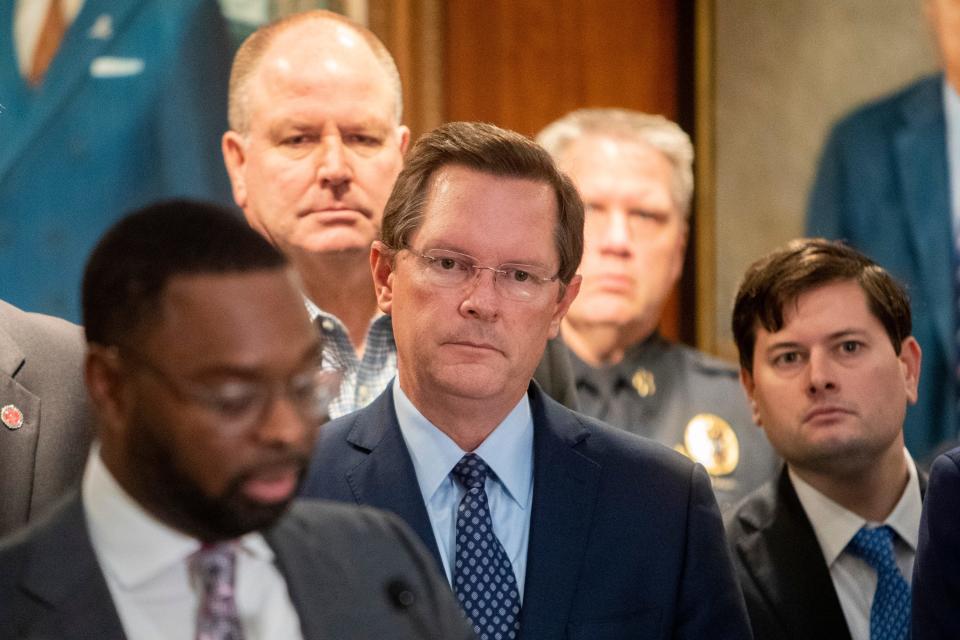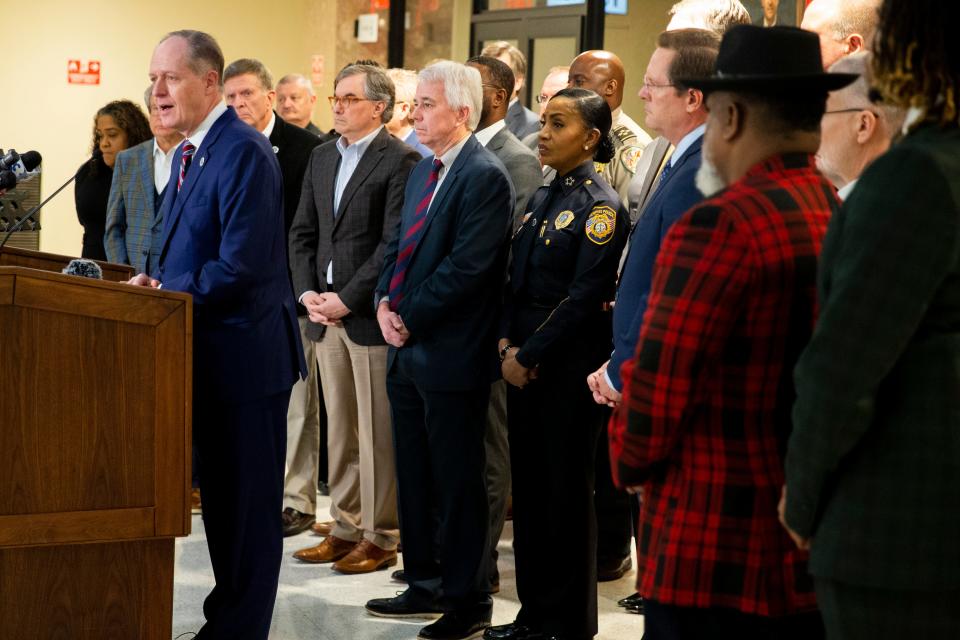Legislative measures targeting bail processes in Tennessee move forward. What happens next
A pair of legislative measures that would reshape the bail system in Tennessee moved forward in a state House of Representatives subcommittee Tuesday with near unanimous "aye" votes for both.
The first measure up for consideration was a constitutional amendment, filed by House Speaker Cameron Sexton, R-Crossville, that would enable Tennessee judges to deny bail for a broader set of charges, including acts of terrorism, second-degree murder, aggravated rape of a child, aggravated rape, and grave torture.
Language in the amendment also allows bail denial for other offenses where the convicted has to serve at least 85% of the sentence. Currently, judges in Tennessee can allow deny bail for first-degree murder.
The amendment has, so far, received increasingly rare bipartisan support from lawmakers and elected Memphis and Shelby County officials. A late January news conference detailing the amendment was attended not only by Sexton, the amendment's sponsor, but also by Shelby County District Attorney Steve Mulroy, Memphis Mayor Paul Young, and local law enforcement officials.

Bail has been the focal point of frustrated law enforcement and elected officials in response to a year-over-year rise in homicides, and steady gains in major violent crimes since 2022 in Memphis and Shelby County.
Former Memphis Mayor Jim Strickland and Memphis Police Department brass both have pointed to the bail current process, in both subtle and not-so-subtle ways, as a root cause that contributes to Memphis' rise in violent crimes, citing repeat offenders as a primary culprit.
Mulroy has pushed back on this assertion, pointing to data from his office that shows since the start of 2021, 12.5% of all offenses committed were alleged to have been committed by people out on bail. The data also shows less than 1% of offenses committed while the offender was out on bail were violent offenses.
The amendment's arrival also comes as Shelby County's reformed bail system rolled out a year ago. The new system, which included a bail hearing room, drew political scrutiny despite general sessions court data that shows bail amounts have increased overall. The data also shows that fewer accused offenders are being arrested while out on bail.

Mulroy has stated that while the amendment has his conditional support, he does not expect the amendment to be a "radical" game changer.
State Rep. Gloria Johnson, D-Knoxville, was the sole "no" vote for the amendment in subcommittee Tuesday.
Memphis criminal justice reform nonprofit Just City has also opposed the amendment.
The amendment would have to pass the legislature this year and again next year before it could go before voters for approval in the 2026 gubernatorial election.
Bill that would make financial status a non-factor in bail hearings contested by Memphians
A second measure, a bill that would amend a judge or magistrate's lawful requirement to consider an accused person's financial ability to pay bail, moved forward Tuesday with a majority vote in favor.
Several Memphis delegates attended and spoke at Tuesday's hearing, warning of not only inequity in how bail will be assessed, but the potential ramifications of crowded jails, rising budgets, and lawsuits.
More: Shelby County judge reprimanded by state board for saying he 'detests' bail bond system
"This bill impacts the poorest in our society," said Nashville defense attorney Madison Biggs. "It only seeks to harm those who need help most."
Just City Executive Director Josh Spickler said the bill could translate into guaranteed detention for low or no-income Shelby Countians — a further exacerbation of an already unbalanced cash bail process.
Defenders of the bill said the ability to pay bail is but one of multiple criteria magistrates must consider when setting bail amounts; other levers besides income could also determine a fair bail. Additionally, the language of the bill still allows for defendants to petition the bail amount, just not immediately.
Both measures will move to a full committee vote.
Micaela Watts is a reporter for The Commercial Appeal covering issues tied to hospitals, healthcare, and resource access. She can be reached at micaela.watts@commercialappeal.com.
This article originally appeared on Memphis Commercial Appeal: Proposed laws targeting bail in Tennessee move forward to House committee

